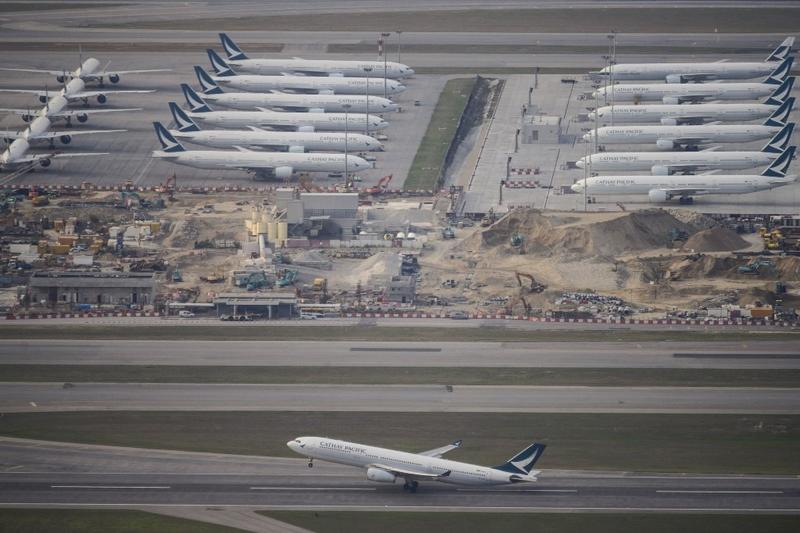 A Cathay Pacific passenger airplane takes off as other aircraft belonging to the Hong Kong-based carrier are seen parked on the tarmac at Hong Kong's Chek Lap Kok International Airport on March 10, 2020.
(ANTHONY WALLACE / AFP
A Cathay Pacific passenger airplane takes off as other aircraft belonging to the Hong Kong-based carrier are seen parked on the tarmac at Hong Kong's Chek Lap Kok International Airport on March 10, 2020.
(ANTHONY WALLACE / AFP
HONG KONG - Cathay Pacific Airways on Wednesday forecast a “substantial loss” in the first half of 2020 as the coronavirus hurts travel demand and aggravates the challenges facing the Hong Kong-based carrier already battered by months of social unrest last year.
The forecast came as Cathay said its net income tumbled 28 percent to better-than-expected HK$1.69 billion (US$218 million) in 2019. Profit in the traditionally stronger second half of the year was only HK$344 million as social unrest and China-US trade tension intensified, the carrier said in a statement Wednesday.
READ MORE: Cathay Pacific asks 27,000 employees to take unpaid leave
“We were faced with an incredibly challenging environment to operate as the Hong Kong economy slipped into recession. Our second-half results – traditionally stronger compared to first-half results – fell well below what we would have hoped for,” Cathay Chairman Patrick Healy said in the statement.
We were faced with an incredibly challenging environment to operate as the Hong Kong economy slipped into recession. Our second-half results – traditionally stronger compared to first-half results – fell well below what we would have hoped for
Patrick Healy, Cathay Chairman
Travel demand has dropped sharply last year. The airline carried 0.7 percent fewer passengers in 2019 compared with 2018.
“Incidents in Hong Kong in the second half of the year significantly reduced load factors, forward bookings and the number of passengers we carried,” said Healy. He noted inbound traffic was hit hard, particularly on short-haul and Chinese mainland routes.
In 2019, revenue passenger kilometers to and from mainland were down 10.9 percent compared with 2018. Overall revenue including passenger services and cargo services dropped 3.7 percent to HK$106.97 billion.
The coronavirus outbreak has exacerbated Cathay’s troubles and put it on course for its first loss in two years.
The airline expected the first half of 2020 to be “extremely challenging financially”, with the epidemic outbreak adversely impacting its financial performance and liquidity position, it said in the statement.
The airline has slashed capacity to the Chinese mainland by 90 percent and reduced its entire international network by about 40 percent because of the coronavirus, which has infected nearly 120,000 people and killed more than 4,200 worldwide. Cathay, which is particularly exposed to the virus because close to half of its revenue comes from Hong Kong and the Chinese mainland, also asked employees to take unpaid leave as it tries to weather the latest crisis.

Cathay shares were up 1.3 percent as trading resumed after the midday trading break in Hong Kong, paring an earlier gain of 1.9 percent.
Cathay said it is likely to continue cutting passenger capacity in May following reductions of about 30 percent in February and 65 percent for March and April in terms of available seat kilometers.
It also reduced flight frequencies by 65 percent and 75 percent in March and April, respectively, adding it is difficult to predict "when these conditions will improve."
Hong Kong Express, the low-cost carrier purchased by Cathay last year, reported a loss for 2019, against expectations of a small profit. It saw a loss of HK$246 million for the period from July 20 to Dec 31 last year after the acquisition. The airline has suffered from reduced demand to and from Asia destinations due to the social unrest in Hong Kong.
ALSO READ: Cathay Pacific CEO resigns amid turmoil in airline
Airlines globally have been hit hard by the coronavirus outbreak, with the International Air Transport Association saying it could cost the industry as much as US$113 billion in lost revenue this year. Flybe collapsed last week as the epidemic ended prospects for a UK state-backed rescue, while carriers from United Airlines Holdings and Singapore Airlines to Deutsche Lufthansa AG and Qantas Airways are slashing flights.
“The situation in 2020 will be much more severe than in 2019” said Luya You, a transport analyst at Bocom International.
Edith Lu contributed to this report


